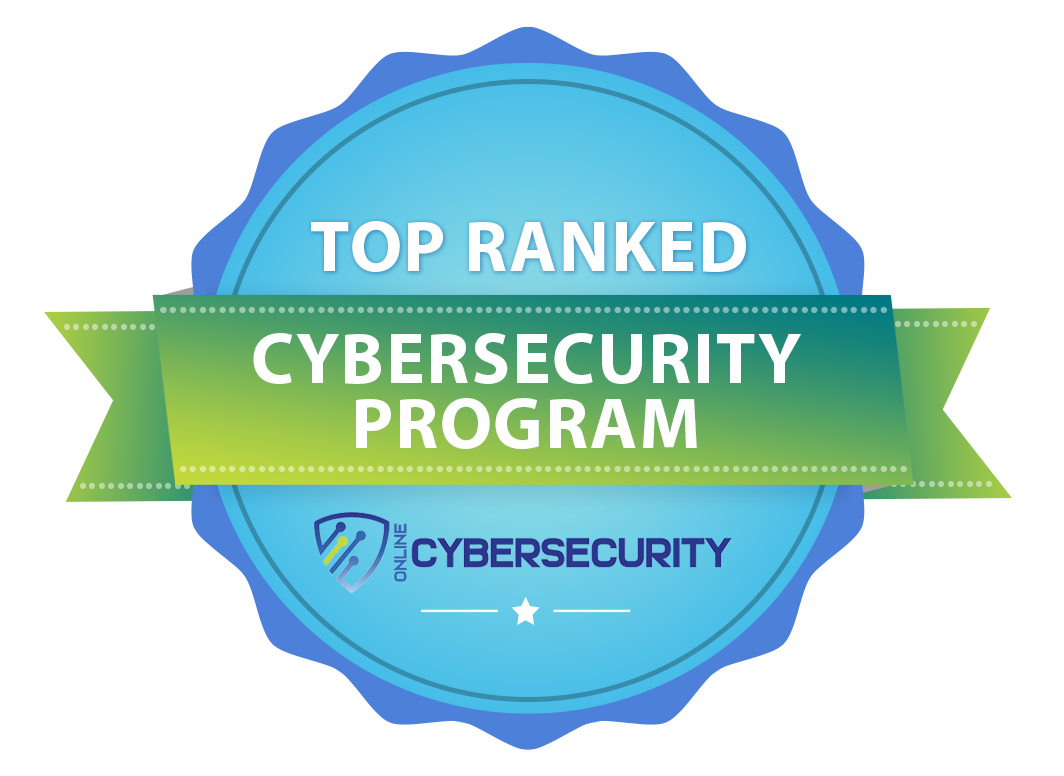


Requirements
and Restrictions
Learning Work?
or Live Event

Online Cyber Security Degree
Classes Begin: March 30, 20262-4 years
Fully Online
185
Prepare for roles in computer system admin & cybersecurity
Bachelor of Science in Computing & Security Technology
The online Bachelor's in Computing and Security Technology program focuses on educating professionals in a variety of corporate, government and non-profit organizations for critical roles in computer system administration and cyber security.
Drexel University’s computing and cyber security program emphasizes practical hands-on education and provides fundamental concepts that are supplemented by work experience. The curriculum is designed for those currently employed in the field of information technology who are seeking a career change or personal enrichment; or working adults who have already earned an associate's degree or completed approximately two years of college work.
Program Ranking
Recognized as the #1 ranked online cybersecurity program by Online Security. This distinction underscores our program’s leadership in cybersecurity education, showcasing an innovative curriculum, distinguished faculty, and a steadfast commitment to preparing students for the evolving challenges of the digital landscape.

Upon Graduation, you will be able to:
- Analyze a problem, and identify and define the computing requirements appropriate to its solution
- Design, implement, and evaluate a computer-based system, process, component, or program to meet desired needs
- Function effectively on teams to accomplish a common goal
- Understand professional, ethical, legal, security, and social issues and responsibilities
- Communicate effectively with a range of audiences
- Analyze the local and global impact of computing on individuals, organizations, and society
- Recognize the need for and engage in continuing professional development
- Utilize current techniques, skills, and tools necessary for computing practice
What Can I Do With A Degree in Computing And Security Technology?
Drexel University’s online BS in Computing and Security Technology prepares you with the foundational knowledge you need to fill critical roles in computing system administration and cyber security within corporate, government or nonprofit organizations. Whether you’re just starting out in your career or are looking to change fields, Drexel’s online cyber security degree is designed to help you gain a competitive edge in the workplace.
Graduates with a computing and cyber security degree can hold a number of lucrative positions such as:
- Chief Information Security Officer
- Information Security Analysts
- Forensic Computer Analyst
- IT Security Engineer
- Security Systems Administrator
What salary can I earn in Computing?
While the field of computing covers a wide range of jobs, the most common involve computer systems administration. In fact, computer systems administrator ranked #9 in "Best Technology Jobs" in U.S. News & World Report’s 2021 "Best Technical Jobs" rankings. The median salary for a computer systems administrator is $83,510, with the highest paid professionals in the field making over $127,000. From the Bureau of Labor Statistics, concerning jobs related to the Computing Technology concentration, "Employment in computer and information technology occupations is projected to grow 11 percent from 2019 to 2029, much faster than the average for all occupations."
What salary can I earn in Cyber Security?
Cyber security professionals can look forward to an increase in job opportunities in the coming years. According to the Bureau of Labor Statistics, "Employment of information security analysts is projected to grow 31 percent from 2019 to 2029, much faster than the average for all occupations." The average salary in the field is no less encouraging, with the median pay for information security analysts in 2020 coming in at $103,590 per year.
5 Reasons You Should Earn a BS in Computing & Security Technology
The world of cybersecurity changes fast. You need a degree that can keep up with the latest trends and technology. Chris Carroll, Teaching Professor and Program Director for Drexel University's online BS in Computing and Security Technology, explains why a degree in CST prepares you for a career in this rapidly growing field.
BS in Computing and Security Technology Degree Online Features
- Flexible, fully online program you can take at your own pace
- Choose a concentration in either Computing Security or Computing Technology
Credit for Prior Learning
If you've recently completed IT certifications from CompTIA, Microsoft, Oracle, Cisco, SANS Institute, or Red Hat, you may be eligible to earn additional credit toward your bachelor's degree. Courses within this program also help prepare you for additional certifications, offering the potential for career and salary growth.
Archived Webinar
Related Program
State restrictions may apply to some programs.
Courses
This program is organized into four 10-week quarters per year (as opposed to the traditional two semester system) which means you can take more courses in a shorter time period. One semester credit is equivalent to 1.5 quarter credits.
You can transfer up to 90 quarter credits from any accredited institution of higher learning as long as the grade is a C or better. Most credits will fulfill liberal arts or general classes.
| Computing & Security Technology Core Requirements | ||
| CT 140 | Network Administration I | 3.0 |
| CT 200 | Server I | 3.0 |
| CT 201 | Information Technology Security I | 3.0 |
| CT 210 | Open Server I | 3.0 |
| CT 301 | Information Technology Security II | 3.0 |
| CT 310 | Open Server II | 3.0 |
| CT 320 | Server II | 3.0 |
| CT 330 | Network Administration II | 3.0 |
| Students completing this major must select either a concentration in Computing Technology or a concentration in Computing Security. see below | 21.0 | |
| Information Science Requirements | ||
| INFO 101 | Introduction to Computing and Security Technology | 3.0 |
| INFO 102 | Introduction to Information Systems | 3.0 |
| INFO 103 | Introduction to Data Science | 3.0 |
| INFO 200 | Systems Analysis I | 3.0 |
| INFO 210 | Database Management Systems | 3.0 |
| INFO 215 | Social Aspects of Information Systems | 3.0 |
| INFO 310 | Human-Centered Design Process & Methods | 3.0 |
| INFO 324 [WI] | Team Process and Product | 3.0 |
| INFO 355 | Systems Analysis II | 3.0 |
| INFO 365 | Database Administration I | 3.0 |
| INFO 420 | Software Project Management | 3.0 |
| Programming Requirements | ||
| Choose one of the following sequences | 9.0 | |
|
INFO 151
& CS 171 & CS 172 |
Web Systems and Services I and Computer Programming I and Computer Programming II |
|
|
INFO 151
& INFO 152 & INFO 153 |
Web Systems and Services I and Web Systems and Services II and Applied Data Management |
|
| Computing & Informatics Requirements | ||
| CI 101 | Computing and Informatics Design I | 2.0 |
| CI 102 | Computing and Informatics Design II | 2.0 |
| CI 103 | Computing and Informatics Design III | 2.0 |
| CT 491 [WI] | Senior Project I | 3.0 |
| CT 496 [WI] | Senior Project II | 3.0 |
| CCI elective * | 6.0 | |
| Mathematics Requirements | ||
| Choose Mathematics Sequence | 8.0 | |
| If a Math sequence of 8 credits is taken, additional 1 credits added to free electives | ||
|
MATH 171
& MATH 172 & MATH 173 |
Introduction to Analysis A and Introduction to Analysis B and Introduction to Analysis C |
|
|
MATH 121
& MATH 122 |
Calculus I and Calculus II |
|
| MATH 180 | Discrete Computational Structures | 4.0 |
| STAT 201 | Introduction to Business Statistics | 4.0 |
| Natural Science Requirements | ||
| Select 8.0 credits from the 100-400 level courses: | 8.0 | |
|
Any BIO (Bioscience & Biotechnology)
|
||
|
Any CHEM (Chemistry)
|
||
|
Any ENSS (Environmental Studies & Sustainability)
|
||
|
Any ENVS (Environmental Science)
|
||
|
Any FDSC (Food Science)
|
||
|
Any GEO (Geoscience)
|
||
|
Any HSCI (Health Science)
|
||
|
Any NFS (Nutrition & Food Science)
|
||
|
Any PHEV (Physics-Environmental Science)
|
||
|
Any PHYS (Physics)
|
||
| Liberal Studies Requirements | ||
| ENGL 101 | Composition and Rhetoric I: Inquiry and Exploratory Research | 3.0 |
| or ENGL 111 | English Composition I | |
| ENGL 102 | Composition and Rhetoric II: Advanced Research and Evidence-Based Writing | 3.0 |
| or ENGL 112 | English Composition II | |
| ENGL 103 | Composition and Rhetoric III: Themes and Genres | 3.0 |
| or ENGL 113 | English Composition III | |
| COM 230 | Techniques of Speaking | 3.0 |
| Liberal Studies Electives | ||
| Select 12.0 credits from the following 100-400 level courses: | 12.0 | |
|
Any ANTH (Anthropology)
|
||
|
Any ARTH (Art History)
|
||
|
Any COM (Communication)
|
||
|
Any ECON (Economics)
|
||
|
Any ENGL (English)
|
||
|
Any ENTP (Entrepreneurship and Innovation)
|
||
|
Any FMST (Film Studies)
|
||
|
Any HIST (History)
|
||
|
Any LAW (Law)
|
||
|
Any MUSC (Music)
|
||
|
Any PHIL (Philosophy)
|
||
|
Any PSCI (Political Science)
|
||
|
Any PSY (Psychology)
|
||
|
Any SOC (Sociology)
|
||
|
Any TVST (TV Studies)
|
||
|
Any VSST (Visual Studies)
|
||
|
Any WRIT (Writing)
|
||
| University Requirements | ||
| UNIV CI101 | The Drexel Experience | 2.0 |
| or CI 120 | CCI Transfer Student Seminar | |
| CIVC 101 | Introduction to Civic Engagement | 1.0 |
| COOP 101 | Career Management and Professional Development | 1.0 |
| Free Electives | 28.0 | |
| Total Credits | 185.0 | |
Admissions Criteria
- Transfer Students
- A minimum of 24 previous college semester credits (36 quarter credits) with a grade of C or better, and earned within the past 10 years from a regionally accredited institution
- Credit for courses in science, mathematics, information technology, computer science, and information science will only be given for courses taken within the past 10 years
- A minimum of 24 previous college semester credits (36 quarter credits) with a grade of C or better, and earned within the past 10 years from a regionally accredited institution
- Non-Matriculated Option
- Drexel University also offers a non-matriculated option, where you can take courses without being enrolled in a degree-granting program
Required Documents
With multiple ways to submit documents, Drexel makes it easy to complete your application. Learn more by visiting our Completing Your Application Guide.
- A completed application
- Official transcripts from all universities or colleges and other post-secondary educational institutions attended (including trade schools)
- Additional requirements for International Students
Tuition
The tuition rate for the academic year 2025-2026 is $609 per credit. (A 40% tuition savings off Drexel's regular tuition rate of $1015 per credit)
The 40% tuition savings applies only to new students and cannot be combined with any other tuition benefits available through Drexel University.
- This program is eligible for Financial Aid.
- Special tuition rates available for Drexel University Alumni, Military members, and members of our Partner Organizations
- These rates apply only to new online students and students being readmitted.
- Tuition rates are subject to increase with the start of each academic year in the fall term.
- All students must contact applyDUonline@drexel.edu within the first two weeks of the term to request tuition savings for which they qualify.
- Special rates cannot be combined. If you qualify for more than one special rate, you'll be given the one with the largest savings.
- When receiving special tuition plans, you may not be able to combine them with other tuition benefits that may be available from Drexel University.
Academic Calendar
2025-2026 Academic Year
Term
Classes Begin
Classes End
Exams Begin
Exams End
Fall 2025
September 22, 2025
December 6, 2025
December 8, 2025
December 13, 2025
Winter 2026
January 5, 2026
March 14, 2026
March 16, 2026
March 21, 2026
Spring 2026
March 30, 2026
June 6, 2026
June 8, 2026
June 13, 2026
Summer 2026
June 22, 2026
August 29, 2026
August 31, 2026
September 5, 2026


© All Rights Reserved

